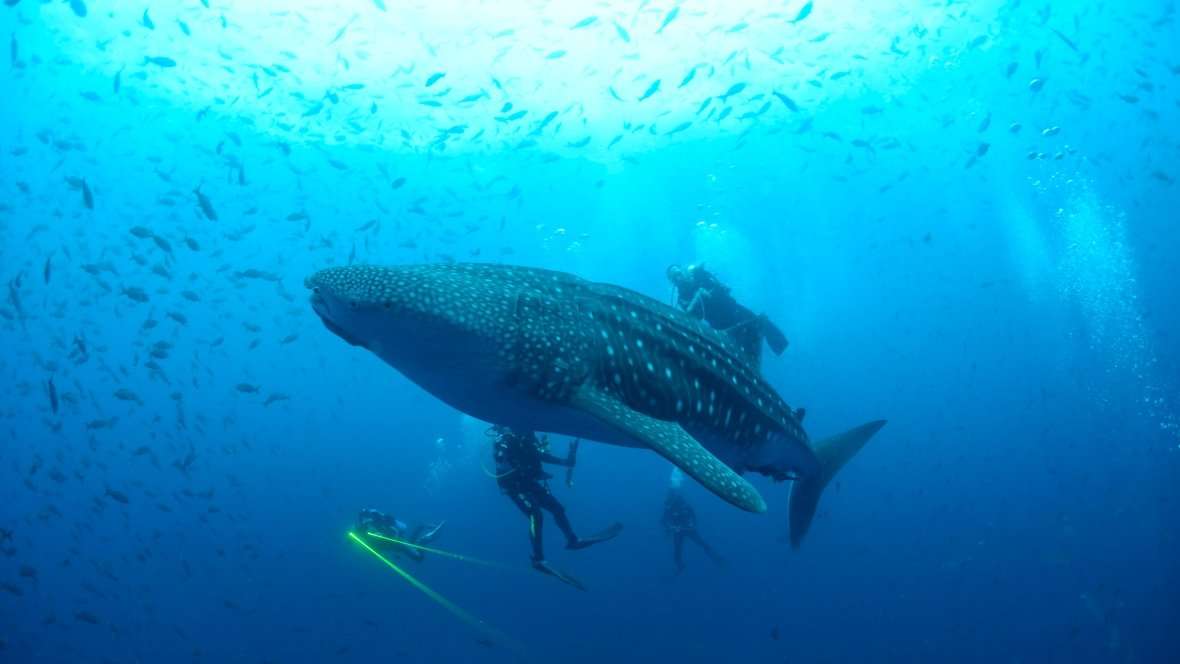Shark fins and manta ray gills found for sale in stores and markets in Vancouver and in China just a few years ago belonged mainly to species that are now listed as at-risk and banned for trade, DNA testing shows. Researchers led by Dirk Steinke at the University of Guelph found that 71 per cent of more than 100 samples tested belonged to species that are considered at risk of extinction, including the whale shark, the largest fish in the world. It has been listed as "vulnerable" by the International Union of Conservation since 2003.
Shark fins are traditionally made into soup that is served as an expensive delicacy - it can cost more than $100 per bowl - at Chinese banquets for special occasions such as weddings. (Kin Cheung/Associated Press)
Shark fins are traditionally made into soup that is served as an expensive delicacy — it can cost more than $100 per bowl — at Chinese banquets for special occasions such as weddings.
Manta and mobula ray gill rakers, thin filaments that the animals use to filter food from the water, are used in traditional Chinese medicine. According to the conservation group Manta Ray of Hope, they are promoted as a cure for ailments ranging from chickenpox to cancer in some Chinese communities.
Shark finning is also banned in some countries such as Canada because it involves removing the fin from a live shark and throwing the rest of the animal back in the water to die a slow death.
Steinke said he and his colleagues started the research after hearing reports about threatened species being fished, and after being approached by the Vancouver Animal Defence League, which had concerns that the shark fins were sold locally.
"We got curious for Canadians, especially in Vancouver," he said. He added that Canada is the largest importer of shark fins outside southeast Asia. According to Statistics Canada, in 2016, Canada imported 140,750 kilograms of shark fins worth $3.08 million.
In 2011 and 2012, University of Guelph researchers and volunteers from the Vancouver Animal Defense League collected 71 dried shark fins from Vancouver stores and markets.
"It took them awhile to get the money together because they're not cheap," Steinke said.
Meanwhile, Scientists working with the Save Our Seas Shark Research Centre at Nova Southeastern University obtained 54 ray gill plates from Hong Kong and mainland China.
In this Oct. 18, 2011 photo, manta ray swims in the water, off Raja Ampat islands, Indonesia. Manta and mobula ray gill rakers, thin filaments that the animals use to filter food from the water, are used in traditional Chinese medicine. (Herman Harsoyo/Associated Press)
The samples were analyzed using a technique developed at the University of Guelph called DNA barcoding. The method allows individual species to be identified from small pieces of DNA.
Steinke said the technique for drying shark fins for sale actually helps preserve the DNA, making the testing relatively simple — as long as the fins haven't already been turned into soup.
The testing found 20 species of sharks and five species of rays. Of those species, 56 per cent are on the IUCN Red List as endangered or vulnerable, while 24 per cent are near threatened.
Seven of the shark species and all five of the ray species are banned from international trade under the Convention on International Trade in Endangered Species . The start of the trade bans mostly began between 2014 and 2017, after the samples were collected.
"However, the confirmed occurrence of these species' body parts in recent trade suggests ongoing market demands," the researchers wrote.
The proportion of threatened species is high considering that that three quarters of sharks and rays are not considered threatened with extinction — and the fact that Canada bans the import of fins of at-risk shark species.
Steinke said that's "very frustrating, although not unexpected," given that rarer types of fins are worth more.
Shark fins, which cost between $366 and $489 Cdn. per pound, are on display inside a dried seafood store in Hong Kong, January 2, 2013. The price varies with the size and type of the fin. (Bobby Yip/Reuters)
He added that authorities don't have the resources to enforce laws about shark fins on a large scale, especially since there's no way to tell simply by looking what kind of dried shark fin you've come across.
Even if someone is caught and fined occasionally, shark fins are so valuable that selling illegal species "might overall still pay off," Steinke said.
DNA testing — which now costs as little as $10 a sample, but can take several weeks — may make enforcement easier, he added.
Steinke hopes the research will raise public awareness about the issue.
"If demand goes down because people get more aware and say, 'I don't want to be a part of this' … the market gets a hit."
He also hopes it might encourage politicians to ban shark fins on a larger scale. Shark fins are banned in more than a dozen municipalities across the country, but a private member's bills pushing for a federal ban failed in 2013 and in 2016.
The research was funded by the Government of Canada, the Alfred P. Sloan Foundation, the Save Our Seas Foundation and the Guy Harvey Ocean Foundation.

iliketoes_forgot on August 27th, 2017 at 07:16 UTC »
Probably Seattle as well. There's a crazy fish store in an alley that my Chinese friends told me to never go in to without them present. Obviously, I went there. Once.
JeffBoner on August 27th, 2017 at 04:58 UTC »
Canadian government should come down on any store and person HARD for being involved in this.
drewiepoodle on August 26th, 2017 at 23:57 UTC »
Link to abstract:- DNA analysis of traded shark fins and mobulid gill plates reveals a high proportion of species of conservation concern